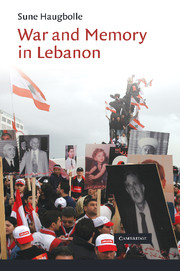Book contents
- Frontmatter
- Contents
- Figures
- Acknowledgments
- Note on Transliteration
- Acronyms
- War and Memory in Lebanon
- Prologue: A Hiatus of History
- 1 Remembering a War of Selves and Others
- 2 Culture, Politics, Civil War
- 3 Discourses on Amnesia and Reconstruction: Memory in the 1990s
- 4 Nostalgias
- 5 Inside Violence
- 6 Sectarian Memory Cultures
- 7 Truth Telling in the Independence Intifada
- Conclusion
- Bibliography
- Index
- Titles in the series
Conclusion
Published online by Cambridge University Press: 05 May 2010
- Frontmatter
- Contents
- Figures
- Acknowledgments
- Note on Transliteration
- Acronyms
- War and Memory in Lebanon
- Prologue: A Hiatus of History
- 1 Remembering a War of Selves and Others
- 2 Culture, Politics, Civil War
- 3 Discourses on Amnesia and Reconstruction: Memory in the 1990s
- 4 Nostalgias
- 5 Inside Violence
- 6 Sectarian Memory Cultures
- 7 Truth Telling in the Independence Intifada
- Conclusion
- Bibliography
- Index
- Titles in the series
Summary
This book started with a description of history as a cyclical process in which some periods of the recent past are forgotten while other periods return. For the people who live and imagine Lebanon's modern history, the country's relatively short postcolonial past too often seems destined to repeat itself. The hiatus of history that my adopted mother experienced in 1990 and the relapse to 1975 that people have continued to fear since the murder of Hariri destabilised Lebanese politics in 2005 both signal a deep pessimism on behalf of the country and how difficult the Lebanese find it to imagine the future as different from the past. The 1990s were not the 1960s. And the political crisis of the late 2000s bears little resemblance with the build-up to war in 1975. Why then do so many Lebanese feel like they are living the past? Why will the past not go away?
Although it might be tempting to point to an overload of historical consciousness, Lebanon's memory makers believed that the opposite was the case: the past continues to haunt the Lebanese because it has not been dealt with. They answered to an obvious inability of the Lebanese state, the embodiment of the people's collective will, to offer a narrative that makes sense of Lebanon's experience with modernity, from emancipation to fragmentation, and to halfhearted restitution under the aegis of Syria from 1990 to 2005.
- Type
- Chapter
- Information
- War and Memory in Lebanon , pp. 228 - 238Publisher: Cambridge University PressPrint publication year: 2010



